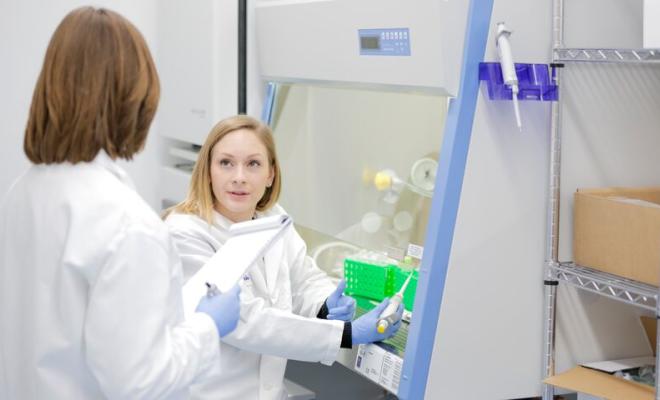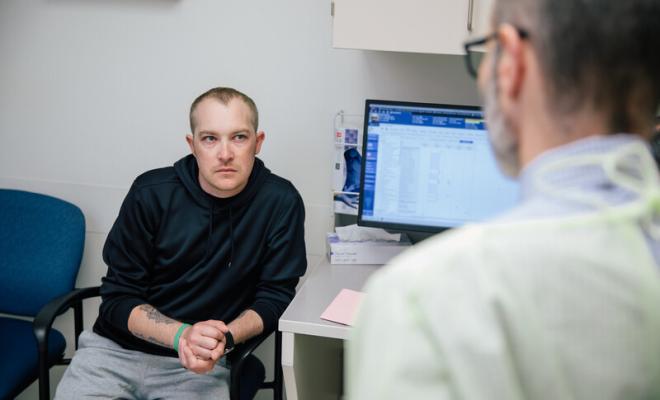Cystic Fibrosis Foundation Evidence-Based Guideline for the Management of CRMS/CFSPID
Green DM, Lahiri T, Raraigh KS, et al. Cystic Fibrosis Foundation Evidence-based Guidelines for the Management of CRMS/CFSPID. Pediatrics. 2024. Apr 5. 153(5):e2023064657 doi: 10.1542/peds.2023-064657. Online ahead of print.
Purpose/Background
Following the implementation of cystic fibrosis screening on all state newborn screens (NBS) in 2010, there has been an increasing incidence of infants categorized as CF transmembrane conductance regulator (CFTR)-related metabolic syndrome/cystic fibrosis screen-positive, inconclusive diagnosis (CRMS/CFSPID). Initial recommendations for management of CRMS/CFSPID were developed in 2009. In 2021, a multidisciplinary expert panel was convened to update the management guideline. This evidence-based guideline is intended to help CF specialists and primary care providers care for people with CRMS/CFSPID and their families. It should supplement the standard care provided in primary care.
CRMS/CFSPID diagnosis is addressed in the CF Diagnosis Clinical Care Guidelines. This guideline, however, addresses genetic testing to better refine the diagnosis. The European CF Society (ECFS) published a consensus guidance in 2021. This guideline is evidence-based and are intended to complement the ECFS paper.
This executive summary highlights the key recommendations from the resultant Evidence-Based Guideline for the Management of CRMS/CFSPID. All recommendation statements can be found in the published manuscript cited above.
Methodology
A panel of 28 CRMS/CFSPID providers and three parents of people with CRMS/CFSPID developed 24 questions in the patient, intervention, comparison, outcome (PICO) format based on four priority areas:
- Genetic testing
- Monitoring
- Treatment
- Psychosocial and communication issues
These questions were informed by survey responses from families of people with CRMS/CFSPID and CF Foundation-accredited care centers. Committee members performed a literature search of PubMed and Cumulative Index to Nursing and Allied Health Literature (CINAHL) databases to develop recommendations. Recommendations were based on the U.S. Preventative Services Task Force (USPSTF) definitions. Thirty of 31 recommendations reached a consensus of 80% or more.
Key Recommendations
Refer to the published guideline for a complete list of recommendations.
| Recommendations | Evaluation of the Evidence |
| Genetics | |
| 1. The CF Foundation recommends that people with CRMS/CFSPID who have <2 disease-causing variants identified by newborn screening (NBS) should undergo sequencing of the coding and flanking regions and deletion/duplication (del/dup) analysis of the coding and exon flanking regions of CFTR. | Grade B, 100% consensus |
| 3. The CF Foundation recommends CFTR genetic evaluation for parents of people with CRMS/CFSPID when phasing the CFTR variants (i.e., in cis or trans) would inform the diagnostic status of the individual by confirming the inheritance pattern. | Grade A, 100% consensus |
| 5. The CF Foundation recommends for families of people with CRMS/CFSPID that health care professionals (HCPs) providing genetic counseling should have training and/or clinical expertise in CF and genetics. A licensed or certified genetic counselor should be accessible to families of people with CRMS/CFSPID for further support, including discussions regarding future reproductive decision-making. | Grade B, 96.2% consensus |
| Monitoring | |
| 6. The CF Foundation recommends for people with CRMS/CFSPID to receive at least annual follow-up by a CF clinician and nurse, with an initial assessment to include social work and/or mental health coordinator and/or genetic counseling provider. Continued follow-up by social work, mental health coordinator, and genetic counseling should be part of the care of CRMS/CFSPID, depending on the needs of that individual and family. | Grade B, 96.2% consensus |
| 7. The CF Foundation recommends for people with CRMS/CFSPID to repeat sweat chloride testing at 6 months of life and annually, at least until age 8 years. | Grade B, 100% consensus |
| 10. The CF Foundation recommends against routine laboratory evaluations, including fat-soluble vitamin testing, liver function testing, glucose monitoring, and blood counts for people with CRMS/CFSPID. | Grade D, 100% consensus |
| Treatment | |
| 13. The CF Foundation recommends for people with CRMS/CFSPID implementation of standard CF Foundation infection prevention control guidelines in health care settings and situations in which there is a high likelihood of being in close contact with multiple people with CF or CRMS/CFSPID. | Grade B, 92.3% consensus |
| 14. The CF Foundation recommends for people with CRMS/CFSPID selectively offering inhaled antibiotics for the treatment of Pseudomonas aeruginosa based on a positive respiratory culture. | Grade C, 96.2% consensus |
| 24. The CF Foundation recommends for people with CRMS/CFSPID that HCPs assess and consider social determinants of health that can influence the understanding and psychological impact of a CRMS/CFSPID diagnosis and tailor communications appropriately. | Grade B, 100% consensus |
| Psychosocial/Communication | |
| 25. The CF Foundation recommends for people with CRMS/CFSPID that HCPs tailor communication about CFTR variants based on shared decision-making to minimize psychological, cognitive, and other barriers to processing and understanding genetic information. | Grade B, 100% consensus |
| 28. The CF Foundation recommends for people with CRMS/CFSPID that the primary care physician and other HCPs involved in the care of individuals with CRMS/CFSPID receive accurate and up-to-date education about CRMS/CFSPID, its management, and their state’s NBS program. | Grade B, 96.2% consensus |
Unanswered Questions
The clinical impact of a Pseudomonas aeruginosa positive respiratory culture among people with CRMS/CFSPID remains uncertain. It is unknown whether people with CRMS/CFSPID would benefit from P. aeruginosa eradication therapy.
Routine use of inhaled therapies, such as hypertonic saline or dornase alfa, have not been studied in people with CRMS/CFSPID. The potential benefits of these therapies, particularly in the setting of respiratory illness, is unknown and should be investigated further.
There was no consensus among committee members on the selective use of chest computed tomography scans for people with CRMS/CFSPID. Further research is needed in this area.
The specific length of time to follow people with CRMS/CFSPID is not determined and should be further studied.
It is unknown whether people with CRMS/CFSPID will transition to a diagnosis of CFTR-related disorder or carrier status, and further research is needed.
Further Reading
- Sadeghi H, Kay DM, Langfelder-Schwind E, et al. Characterization of 223 infants with CFTR-related metabolic syndrome/Cystic fibrosis screen positive, inconclusive diagnosis (CRMS/CFSPID) identified during the first three years of newborn screening via IRT-DNA-SEQ in New York State. J Cyst Fibros. 2024 Nov 11:S1569-1993(24)01808-3. doi: 10.1016/j.jcf.2024.10.015. Epub ahead of print. PMID: 39532587.
- Stanley S, Steve G, Tracey B. Diagnostic Transitions of Cystic Fibrosis and CRMS Compared After 12 Years of Newborn Screening in California. J Pediatr 2025 Jan:276:114287. doi: 10.1016/j.jpeds.2024.114287.Epub 2024 Sep 2.
Use of This Guideline Executive Summary
The CF Foundation intends for this executive summary of its guideline to summarize the published guideline. The published guideline summarizes evidence, and provides reasonable clinical recommendations based on that evidence, to clinicians, patients, and other stakeholders. Care decisions regarding individual patients should be made using a combination of these recommendations, the associated benefit-risk assessment of treatment options from the clinical team, the patient’s individual and unique circumstances, as well as the goals and preferences of the patients and families that the team serves, as a part of shared decision making between the patient and clinician. The guideline is intended to be location agnostic and are applicable to individuals with CF in all settings including but not limited to outpatient clinics, hospitals, in-home, psychiatric facilities, long-term care facilities, incarceration, detention, and foster care settings.
This guideline was prepared by:
Georgene Hergenroeder, MD (Children’s Hospital of Philadelphia, Philadelphia, PA)
Deanna Green, MD, MHS (Johns Hopkins All Children’s Hospital, St Petersburg, FL).
The guideline was published in May 2024, it was reviewed in May 2025, and it was determined that no update is needed at this time.


